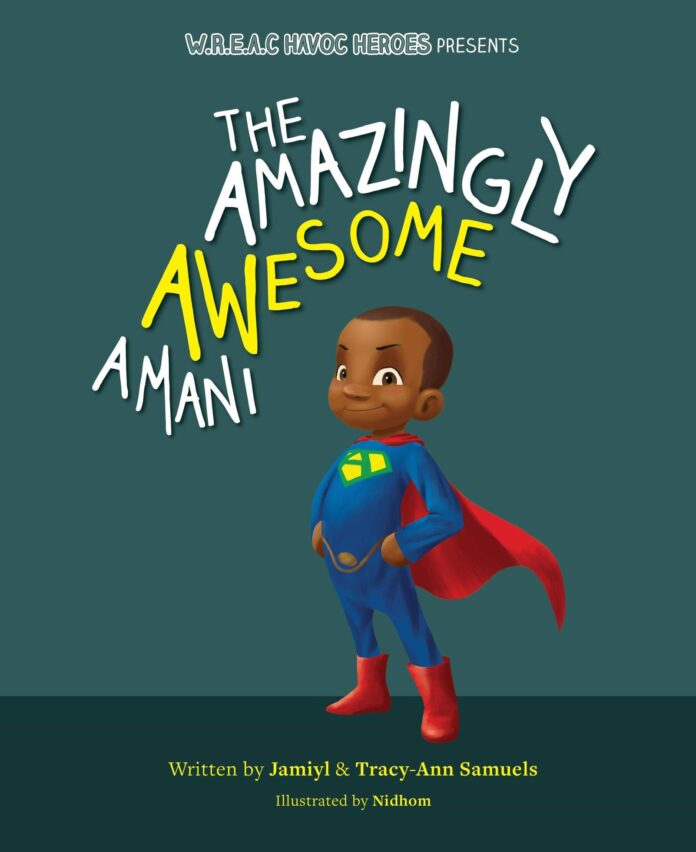( ENSPIRE Features ) Parents Write Superhero Children’s Book Series Based on Son to Raise Awareness About Autism
ENSPIRE Contributor: Natalie Wong
Jamiyl Samuels (JS) and Tracy-Ann Samuels (TS), co-authors and co-founders of “The Amazingly Sensational Kids (T.A.S.K.)” spread awareness for supporting children with autism. Jamiyl and Tracy-Ann are parents to a boy on the Autism spectrum and wrote the children’s superhero book series based on their son Trey’s childhood. Their latest book, “The Sensationally Super Sandy,” helps siblings understand how to react to a brother or sister who is on the spectrum and is also inspired by Trey’s sister Sandy. Suitable for toddlers up to age 12, the T.A.S.K. books seek to educate and entertain through the creation of informed written content, film, music, public speaking, and other media platforms.
The first in a trilogy of books, “The Amazing Adventures of Awesome Amani,” showcases the powerful and sometimes difficult realities of living as a child with autism through the eyes of a young superhero. As social workers themselves, the authors have consistently advocated on behalf of their communities. Jamiyl and Tracy-Ann share their important and valuable insights—covering access to education, anti-bullying, interfamily communications, the challenges faced by at-risk youth and children of color, and their motivations to write their children’s series, in an exclusive interview with ENSPIRE Magazine.
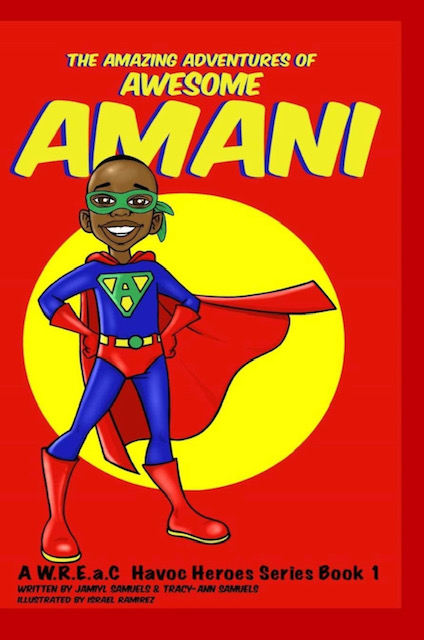
The New York City Queens-based authors have a plethora of experience with young people and social justice. A graduate of Long Island University with a Masters in Media Arts, Jamiyl has been a creative writer for over 25 years and has also worked with at-risk youth at the Rikers Island Correctional Facility in the Young Adult facility. Tracy-Ann received her master’s degree in social work from New York University and has worked with special needs children, families, and more.
TS: As a social worker, I’m exposed to at-risk populations. The majority of our children in care are children of color. I worked with a population that often does not have a voice, the boys and girls are seen and not heard. After working with at-risk children and adolescents for decades, I feel that every child has a story that needs to be told, about their trauma and the journey of their life experiences. Its important children of color have a voice in books to show they can rise up from any adversity. It is our responsibility that they receive the appropriate services in order for them to thrive. This is why writing a children’s book is important because I feel like we are fighting for kids who are non-verbal or autistic or are unable to express themselves and it is our duty to make sure they are represented in a positive way.
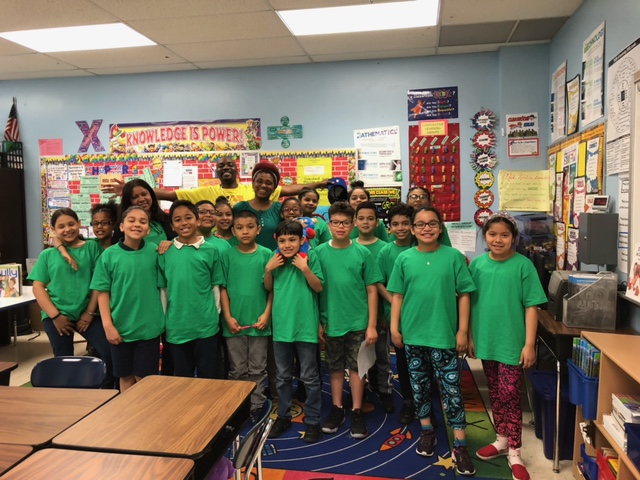
JS: At Rikers, I am exposed to a population of youth who have reached the prison system due to some sort of failure in society. Whether the environment where they grew up did not foster a nurturing, economically or emotionally positive setting where they could thrive, or they were a victim of targeting young Black males due to systemic racism, the majority of the young men I work with are a victim of trying to gain acceptance in the wrong places. I receive a lot of great feedback from my co-workers who have children, however, one case in particular of a young man who was accused of a crime and did not have the voice or wherewithal to defend himself really validated the need for our books. This young man is serving time in prison for a crime he may not have committed because he was an easy target to use as a scapegoat. It was a reminder that we cannot allow our personal feelings about developmental disability to affect our decision-making as it pertains to our children. The people we are hurting are our children if we deny them the help they need.
Jamiyl and Tracy-Ann’s son Trey was diagnosed with autism spectrum disorder at the age of 5 and have a mixed-expressive language disorder. According to the Center for Autism and Developmental Disabilities Research and Epidemiology, University of Pennsylvania, Black children are 5.1 times more likely to be misdiagnosed with behavior disorders before they are correctly diagnosed with autism than White children.
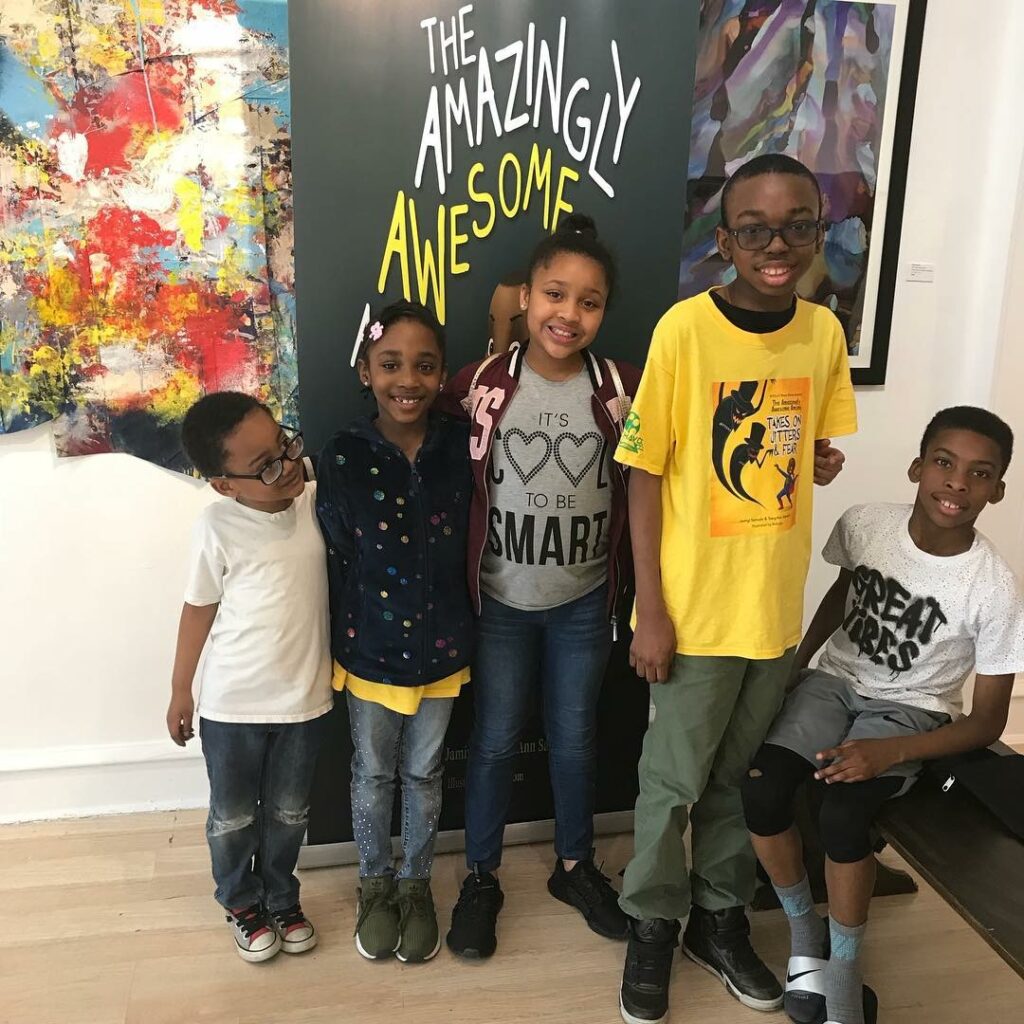
TS: Being a parent of a Black male already has its challenges. Society already has labels on them, but to also add autism spectrum disorder is a double whammy because you are already fearful about what can happen to your child as a Black male—and for him not to be able to socialize properly and possibly be unable to defend himself if he experiences a run-in with law enforcement is extremely scary.
JS: I think of what happened to Elijah McClain in Colorado. How no one at the scene of his arrest was listening to him beg for his life. The total disregard for his voice was heartbreaking. It reminded us of the frustration Trey went through being unable to express himself through words and our challenge of trying to understand what he was trying to tell us.
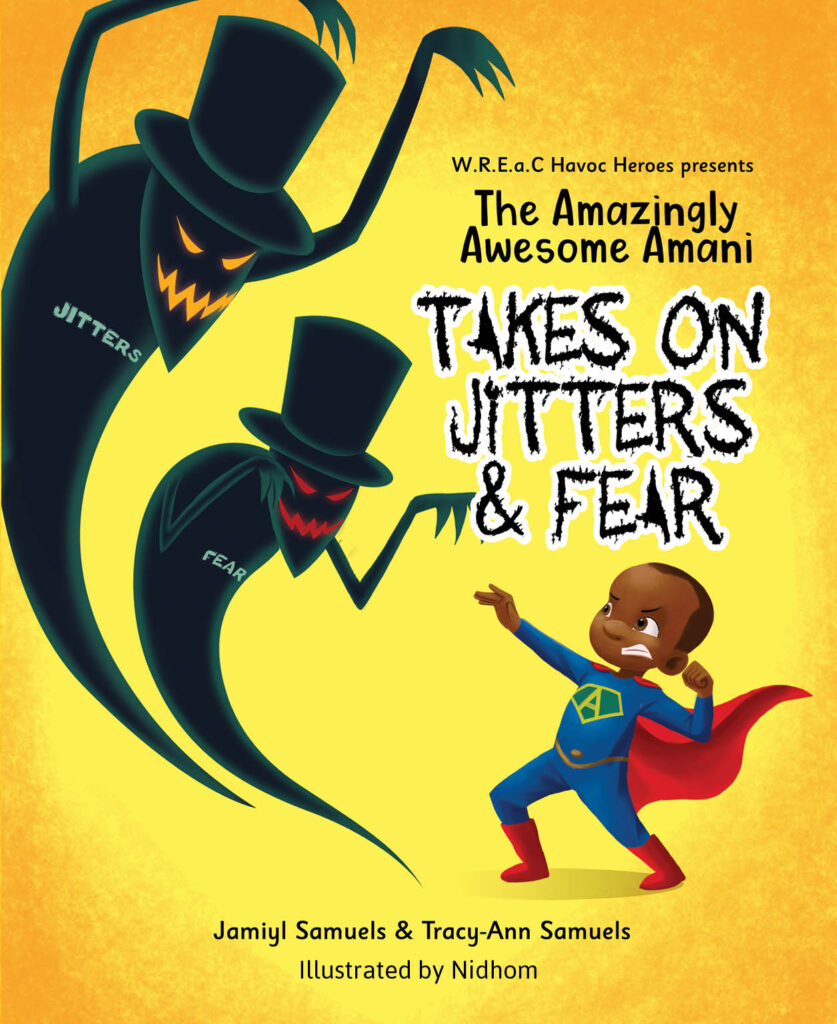
TS: Trey has taught us to trust our faith. We have learned in life that everything cannot be perfect. We learned to have patience. To never give up. We have overcome challenges with Trey’s behavior. He was always a happy child, but we struggled to try to figure out how to help him. His inability to speak to us eventually took a toll on him and his anger boiled over.
JS: It took us a while to figure out that he could not sit still in class and was tapping on things because he was hearing music. All children on the spectrum have a gift. Once we realized Trey’s musical gift and we were able to help him realize that goal through music classes, combined with speech and occupational therapy he became more relaxed and more vocal. He changed the trajectory of what we thought being a parent was. We had to do twice the work to figure out how to help him.
The “Awesome Amani” character of their children’s books follows the adventures of a boy who takes on life’s challenges by the day but is a perfectly “normal” avenger in his dreams. With the love and support of his parents and his love for music, Trey has become a superhero in his own life.
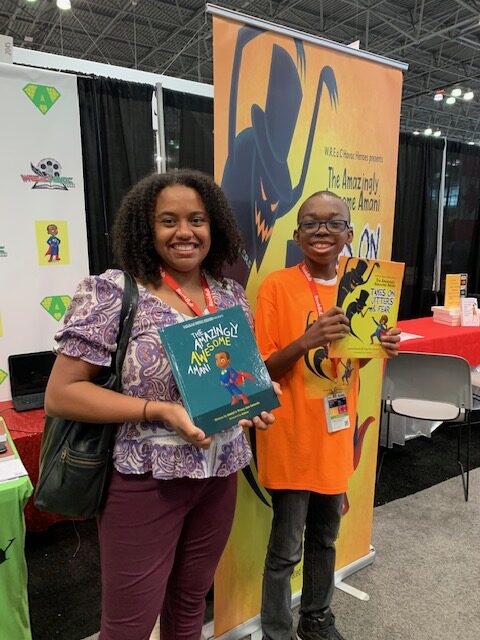
JS: Trey really embraced the fact that he is the subject of a children’s book. At our events, he reads aloud with me, signs his own books, and tells people he is awesome. The confidence he exudes is priceless.
TS: He is able to see himself in literature which is amazing. Representation matters and the impact it has on children of color to know that they can be a hero to someone cannot be understated. By reliving the stories in the book, he is able to communicate how he felt when in the past he could not.
Stigma and stereotypes about Autism and disability, unfortunately, persist in today’s media. But the T.A.S.K. Children’s media company hopes to make a change, ultimately fostering growth, creativity, and education through their content and provide better representation for those on the autism spectrum. Their motto “transparency, advocacy, sensitivity, and knowledge” is the center of all their endeavors to bring forth truth, accountability, service, and kindness.
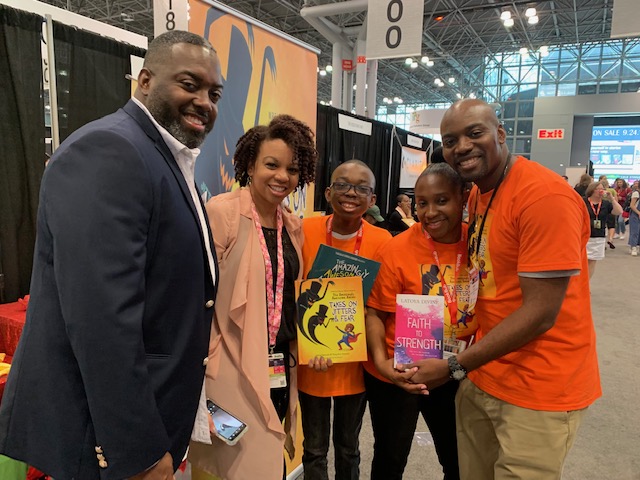
JS: I am grateful that Holly Robinson-Peete was so transparent about her journey a long time ago. Before we even knew Trey was on the spectrum, she opened the door that it became acceptable to even speak about autism in public. Now, we are seeing more people come forward and share their experiences after years of keeping their struggles in the dark, and now there are commercials and different sponsored events specifically focused on autism. There is still such a stigma against autism and special needs where we see people are afraid to address it and hide their children. It is our responsibility as parents that we go out and bring awareness to this cause. Until you go through this you do not know the struggle.
TS: Advocacy is very important to shed light on autism for the disadvantaged who do not have access to services for children to thrive. As a parent of a special needs child, you wonder what is going to become of that child if something happens to you. Unfortunately, there are older people who grow up without services who end up in the criminal justice system because they are unable to communicate. Their actions are taken as a form of aggression. Our goal with our children’s series is to expand our brand to include our own organization that goes out into the community to ensure parents are receiving the right information in order to get their children the help they need.
JS: We want to raise awareness about Autism and show that kids on the spectrum are just as amazing. We want to promote tolerance of not only kids with special needs but also adults. We have experienced adults who have laughed at or openly mocked our son because of certain behaviors he exhibited or his reactions to things that scared him. It was heartbreaking. Empathy is very important. Just because you are not dealing with this issue does not mean you have to be insensitive. I think that’s what leads to the knee-jerk reaction to hide developmental disability. The shame, the self-doubt, the belief that you did something wrong, the fear of what others may think. We say, who cares what other people think? People who really care about you will not turn their backs on you because you have a child with special needs. We want to celebrate their strengths and gifts, not focus on their diagnosis.
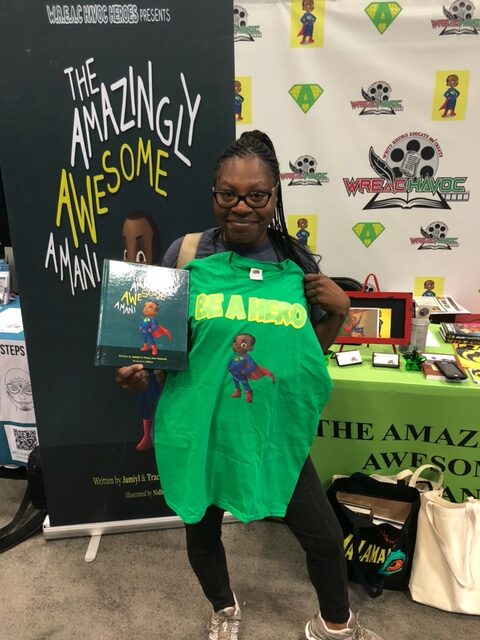
The response to Jamiyl and Tracy-Ann’s work has been astounding. Their book series has been featured on Fox 5 New York, NY 1, Book Riot, Autism Parenting, News 15 KidLit Pick of the Week, and more. More significantly, the book series has changed the lives of parents and children alike.
JS: “The Amazingly Sensational Kids” has changed our lives because it has given us the opportunity to tell our story knowing that it is not ours alone. That so many people are going through the same thing and do not know where to turn or how to begin. It is so important to know that we can touch on such a sensitive issue and make it palatable for kids in the form of seeing themselves as a superhero. Being able to start the conversation with adults about autism awareness, the importance of early intervention, getting past the denial, and the importance of showing empathy and understanding to others who are going through this journey.
TS: The most memorable piece of feedback I received was from teachers who said this book is what was missing in school. They were happy to see a book about a Black boy with a disability. Pre-COVID, annually we were vendors at BookExpo/BookCon at the Jacob Javits Center during which we had so many people stop by our booth and thank us for the work we are doing. One young lady broke down in tears as she told me about her older brother who went undiagnosed. Their parents passed away and she had to make a decision to live her life or be burdened with her older sibling who she was taking care of. We were happy to be able to help her by giving information on the kind of services she needed—it means a lot to us that people know if they need assistance, they can call on us.
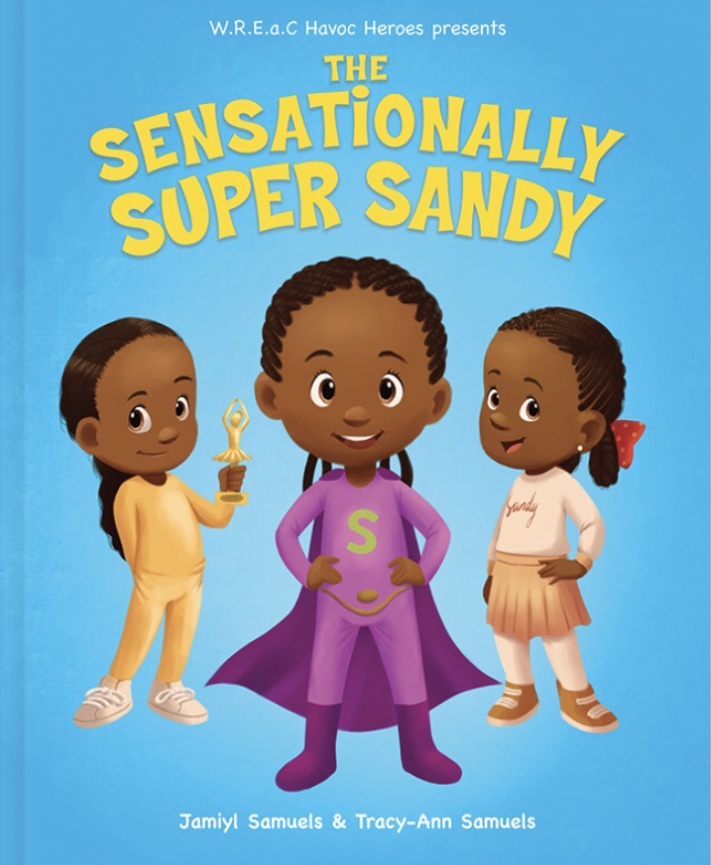
JS: The most memorable feedback I received is from a parent who said her son thinks I am a real superhero because I co-authored the book with a Black superhero on the cover and I read the book at our live and virtual events. To have children be able to relate to something we created is surreal at times, but necessary. It’s important to note that our children’s books are not only about special needs, but children dealing with the loss of a parent, anti-bullying, the importance of family, and positive reinforcement.
The “Amazingly Awesome Amani” and “Sensationally Super Sandy” is available on Amazon now. Find out more about Jamiyl and Tracy-Ann and T.A.S.K. at theamazinglysensationalkids.com.

